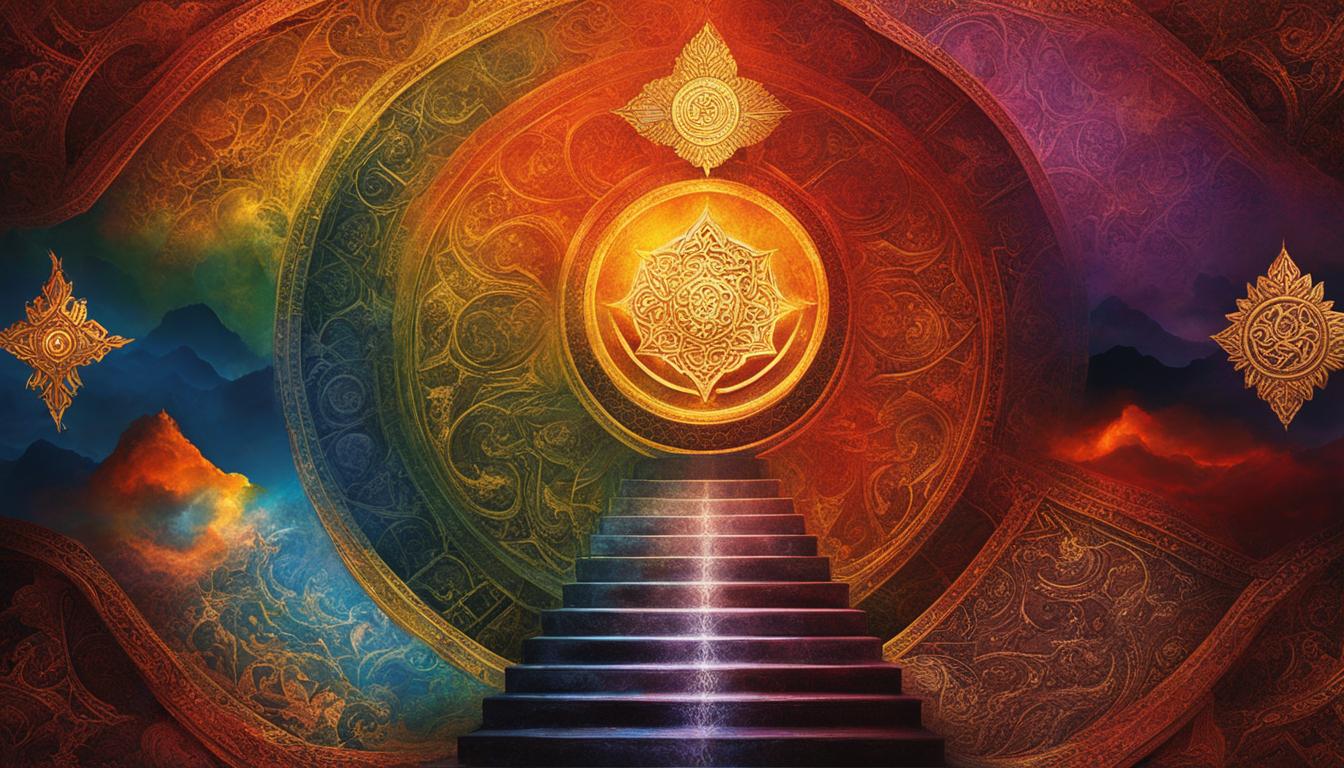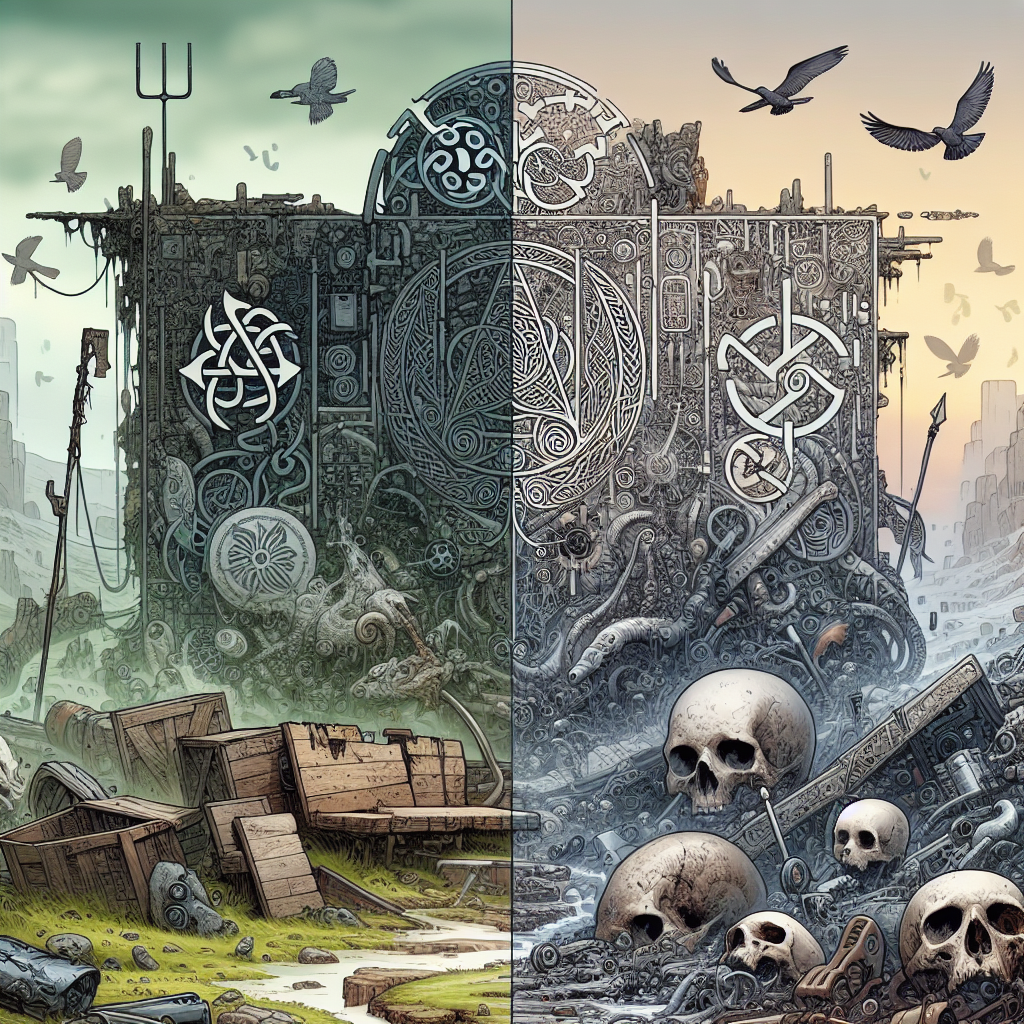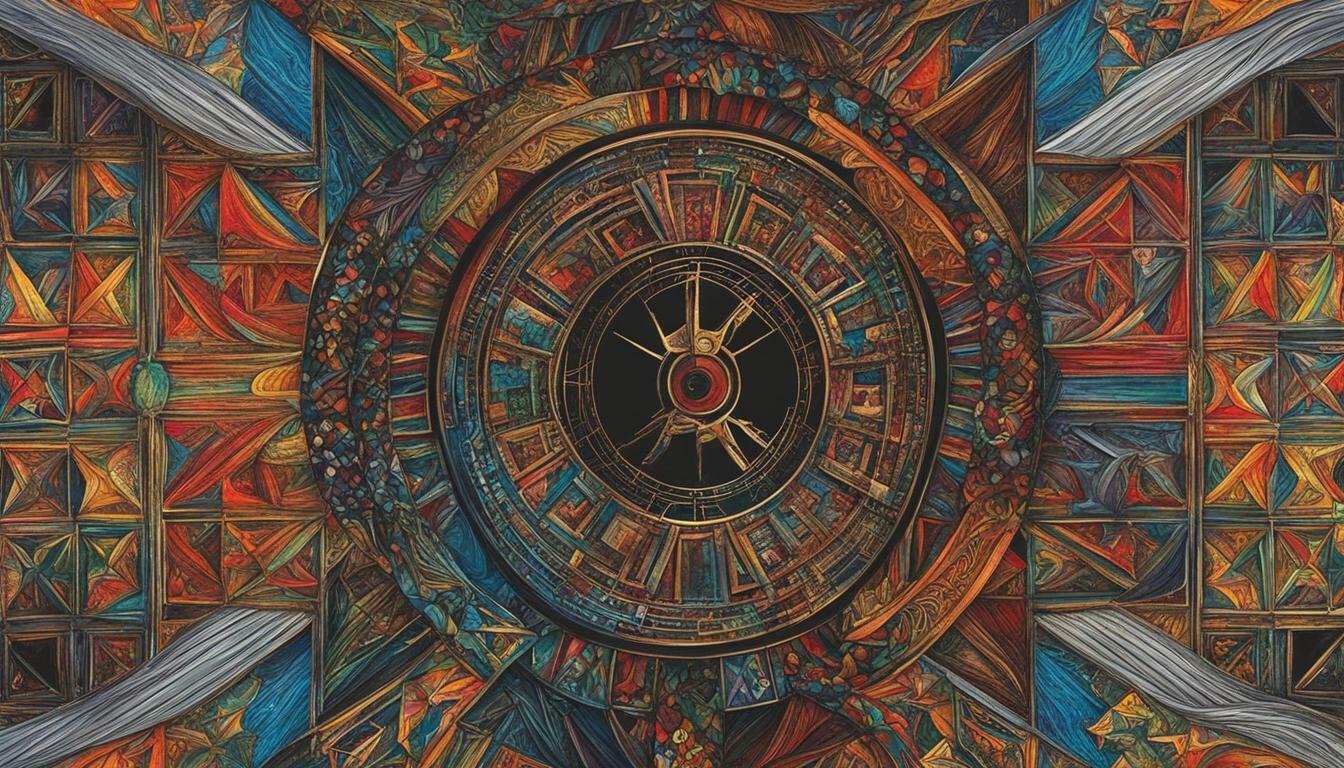Welcome to our article exploring the difference between salvation in Christianity and liberation in Hinduism. These two religious concepts hold profound significance in their respective faiths, offering individuals the promise of spiritual release and a higher state of existence. In this article, we will delve into the distinct beliefs and teachings of each religion, examining how Christianity views salvation and how Hinduism views liberation. Join us as we explore the fascinating contrasts between these two paths to spiritual fulfillment.
Key Takeaways:
- Salvation in Christianity focuses on faith in Jesus Christ and the forgiveness of sins.
- Liberation in Hinduism, also known as Moksha, aims to free individuals from the cycle of life and death.
- Christianity views salvation as a deep personal relationship with God through Jesus Christ.
- Hinduism sees liberation as the attainment of ultimate bliss and awareness.
- Both concepts offer the promise of a higher state of existence and hold profound spiritual significance.
Christianity Views Salvation as Moksha
In Christianity, salvation is often compared to the concept of Moksha in Hinduism. Some Christian thinkers argue that salvation involves a deep personal relationship with God based on love and repentance. They view Jesus Christ as the embodiment of love and believe that accepting Him as the savior leads to salvation or Moksha. This understanding emphasizes the importance of faith in Jesus and the forgiveness of sins through His sacrifice.
Salvation in Christianity is rooted in the belief that humans are born into sin and need to be saved. Through faith in Jesus Christ, individuals can experience forgiveness of their sins and attain eternal salvation. This concept of salvation is closely tied to the idea of liberation from the bondage of sin and the restoration of a right relationship with God.
Christianity teaches that salvation is a gift from God that cannot be earned through good works alone. It is through faith in Jesus and His sacrifice on the cross that individuals can be saved and experience the transformative power of God’s love. This understanding of salvation as Moksha highlights the central role of Jesus Christ in the Christian faith and the profound spiritual significance it holds for believers.
The Role of Faith and Forgiveness in Christianity
In Christianity, faith is seen as a key component of salvation. Believers are called to have faith in Jesus Christ as the savior and rely on His sacrifice for the forgiveness of sins. This faith is not simply a matter of intellectual assent, but a wholehearted trust and surrender to God. Through this faith, individuals can experience the transformative power of God’s grace and be reconciled with Him.
Forgiveness is another essential aspect of salvation in Christianity. Through the sacrifice of Jesus Christ, believers are offered forgiveness for their sins. This forgiveness is not based on their own merits or efforts, but on God’s mercy and love. It is through the forgiveness of sins that individuals can be reconciled with God and experience the fullness of salvation.
| Christianity Views Salvation | Hinduism Views Liberation |
|---|---|
| Based on faith in Jesus Christ | Based on self-realization and liberation from the cycle of life and death |
| Emphasizes forgiveness of sins | Focuses on the attainment of ultimate bliss and awareness |
| Offers eternal salvation in heaven | Leads to liberation from suffering and the restoration of human dignity |
Hinduism Views Liberation as Moksha
In Hinduism, liberation is often referred to as Moksha, which is considered the highest goal and ultimate liberation. It is believed to be a state of liberation from the cycle of life and death, where the soul is freed from the bondage of ignorance and karma. Moksha is characterized by the attainment of ultimate bliss and awareness, leading to the realization of one’s true nature and unity with the divine.
Hindus believe that achieving Moksha requires self-realization and the breaking of the cycle of reincarnation. It is through the pursuit of spiritual knowledge, virtuous actions, and devotion to the divine that individuals can attain liberation. Moksha is seen as a release from the limitations of worldly existence and a return to one’s true essence.
Throughout Hindu scriptures, various paths to Moksha are described, including the path of knowledge (Jnana Yoga), the path of selfless action (Karma Yoga), the path of devotion (Bhakti Yoga), and the path of meditation (Dhyana Yoga). Each path offers a unique approach to achieving liberation and emphasizes different aspects of spiritual practice.
Salvation as Liberation in Christianity
In Christianity, salvation is often equated with liberation from sin and the consequences of sin. It is believed that through faith in Jesus Christ and His sacrifice on the cross, individuals can be forgiven of their sins and receive eternal life. This salvation is seen as a liberation from the bondage of sin and a restoration of a right relationship with God.
The Role of Jesus Christ
Central to the concept of salvation in Christianity is the role of Jesus Christ. Christians believe that Jesus, through His sacrificial death and resurrection, provided the means for salvation and liberation from sin. His perfect life and ultimate sacrifice are seen as the pathway to eternal life and liberation from the power of sin.
The Forgiveness of Sins
Forgiveness of sins is a key aspect of salvation in Christianity. Through faith in Jesus Christ, individuals can have their sins forgiven and reconciled with God. This act of forgiveness is seen as a liberation from the guilt and shame associated with sin, offering believers the opportunity to start anew and live in accordance with God’s will.
Eternal Life
Salvation in Christianity also promises believers eternal life. Through their faith in Jesus Christ, Christians are offered the prospect of living in the presence of God for all eternity. This assurance of eternal life is seen as the ultimate liberation from the limitations and transience of earthly existence.
| Christianity Salvation | Liberation in Hinduism |
|---|---|
| Based on faith in Jesus Christ | Attained through self-realization |
| Focuses on forgiveness of sins | Seeks liberation from the cycle of life and death |
| Promises eternal life in communion with God | Leads to realization of one’s true nature and unity with the divine |
Hinduism Liberation as Salvation
In Hinduism, liberation is often understood as a form of salvation. It is seen as a liberation from suffering and the restoration of lost human dignity. Hindus believe that through the realization of Moksha, individuals are freed from the cycle of birth and death and attain spiritual liberation. This liberation is seen as a salvation from the bondage of worldly existence and a return to one’s true nature.
The concept of suffering plays a crucial role in the understanding of liberation in Hinduism. Hindus believe that life is characterized by suffering, which is caused by ignorance and attachment to the material world. Liberation, or Moksha, is seen as the emancipation from this suffering and the ultimate goal of human existence. It is through the attainment of Moksha that individuals find liberation from the cycle of rebirth and achieve union with the divine.
Restoration of human dignity is another significant aspect of liberation in Hinduism. Hindus believe that through Moksha, individuals regain their true identity as spiritual beings and are freed from the limitations of the physical world. This restoration of human dignity is associated with the realization of one’s inherent divinity and the recognition of the interconnectedness of all beings. It is through liberation that Hindus believe they can fully embrace their true nature and experience ultimate bliss and harmony.
| Hinduism Liberation | Christianity Salvation |
|---|---|
| Seen as a form of salvation | Emphasizes salvation through faith in Jesus Christ |
| Emancipation from suffering and bondage | Liberation from sin and restoration of a right relationship with God |
| Restoration of lost human dignity | Promises forgiveness of sins and eternal life |
Overall, liberation in Hinduism is a multifaceted concept that encompasses salvation from suffering, the restoration of human dignity, and the attainment of spiritual liberation. It is through the realization of Moksha that individuals in Hinduism find ultimate emancipation and achieve union with the divine. While the concept of salvation in Christianity may differ in its approach and focus, both Hinduism liberation and Christianity salvation offer profound spiritual significance and the promise of a higher state of existence.
Different Approaches to Salvation and Liberation
Christianity and Hinduism approach salvation and liberation differently. While both religions seek to provide individuals with a path to spiritual fulfillment, they have distinct beliefs and practices when it comes to achieving salvation and liberation.
Christianity Beliefs
In Christianity, salvation is primarily based on faith in Jesus Christ. Christians believe that through accepting Jesus as their savior and following his teachings, they can be saved and granted eternal life. Salvation is seen as a gift from God, given out of love and grace. It is believed that Jesus’ sacrifice on the cross provides the means for forgiveness of sins and reconciliation with God.
Hinduism Beliefs
In Hinduism, the ultimate goal is liberation, known as Moksha. Hindus believe in the concept of reincarnation, where the soul is reborn in different bodies based on its karma. Liberation is achieved by breaking free from the cycle of life and death and reuniting with the divine. Self-realization, spiritual practices, and the pursuit of knowledge are essential in attaining Moksha. Hinduism offers various paths to liberation, including the path of devotion, knowledge, and righteous action.
| Christianity Salvation | Hinduism Liberation |
|---|---|
| Based on faith in Jesus Christ | Attained through self-realization and liberation from the cycle of life and death |
| Emphasizes forgiveness of sins | Focused on breaking the bondage of ignorance and karma |
| Promises eternal life in heaven | Offers the realization of one’s true nature and unity with the divine |
The Role of Jesus and Other Figures in Salvation and Liberation
In Christianity, Jesus Christ occupies a central role in the process of salvation. He is considered the savior who offers forgiveness of sins and the promise of eternal life. Through faith in Jesus and acceptance of His sacrifice on the cross, believers are granted salvation and liberation from the bondage of sin. This understanding highlights the significance of Jesus as the bridge between humanity and God, making Him the focal point of Christian salvation.
On the other hand, Hinduism recognizes various figures and concepts associated with liberation. While there is no single central figure like Jesus, the belief in liberation through self-realization is central to Hindu philosophy. Hinduism teaches that all souls will eventually attain liberation, known as Moksha, and that the path to liberation can be pursued through various spiritual practices and self-realization. This emphasis on self-realization reflects the diverse nature of Hindu beliefs and the different approaches to liberation within the religion.
The Role of Liberation Figures in Hinduism
In Hinduism, there are also specific figures associated with liberation. One such figure is Lord Krishna, who is revered as the divine incarnation of Lord Vishnu. The teachings of Lord Krishna, as recorded in the Bhagavad Gita, emphasize the importance of self-realization and the pursuit of righteousness as a means to attain liberation. Other liberation figures in Hinduism include Lord Rama, Lord Shiva, and various saints and gurus who have attained spiritual liberation and serve as guides for others on the path to Moksha.
Overall, while Christianity focuses on the role of Jesus Christ as the central figure in salvation, Hinduism recognizes a broader range of liberation figures and emphasizes the pursuit of self-realization as a means to attain liberation. These differences in belief and interpretation highlight the unique perspectives and teachings of each religion when it comes to the role of specific figures in the processes of salvation and liberation.
| Christianity | Hinduism |
|---|---|
| Central figure: Jesus Christ | Various figures associated with liberation, such as Lord Krishna and Lord Rama |
| Emphasis on faith in Jesus and His sacrifice | Emphasis on self-realization and pursuit of righteousness |
| Focus on forgiveness of sins and eternal life | Focus on liberation from the cycle of life and death |
Table: The Role of Jesus and Other Figures in Salvation and Liberation
Understanding Liberation in Hinduism
In Hinduism, liberation, or Moksha, is a profound spiritual goal that encompasses the realization of one’s true nature and unity with the divine. It is the ultimate liberation from the cycle of life and death, leading to the breaking of the bondage of ignorance and karma. Through self-realization and spiritual growth, Hindus seek to attain Moksha and experience ultimate bliss and awareness.
The path to liberation in Hinduism involves various practices and disciplines, including meditation, yoga, self-reflection, and the study of sacred texts. These practices aim to purify the mind, cultivate self-awareness, and dissolve the illusion of separation between the individual and the divine. By understanding the true nature of the self and recognizing the interconnectedness of all beings, Hindus believe they can transcend the limitations of the material world and achieve liberation.
The Key Concepts of Liberation in Hinduism
- Self-realization: The process of understanding and realizing one’s true nature as a divine being.
- Unity with the divine: The attainment of a state of consciousness where one realizes the inherent oneness of all existence and merges with the divine.
- Liberation from ignorance and karma: The liberation from the cycle of life and death, as well as the release from the bondage of ignorance and the consequences of one’s actions (karma).
Throughout history, Hinduism has provided a rich framework for individuals to explore and pursue liberation. It offers diverse paths to Moksha, accommodating different temperaments and inclinations. The ultimate goal, however, remains the same – the liberation from the limited sense of self and the experience of divine union.
| Key Concepts | Liberation in Hinduism |
|---|---|
| Goal | Moksha – liberation from the cycle of life and death |
| Practices | Meditation, yoga, self-reflection, study of sacred texts |
| Process | Self-realization, unity with the divine, liberation from ignorance and karma |

Understanding Salvation in Christianity
In Christianity, salvation is obtained through faith in Jesus Christ and His sacrifice on the cross. It involves the forgiveness of sins and the restoration of a right relationship with God. Through this salvation, individuals are promised eternal life in heaven. The central role of Jesus Christ and His teachings is fundamental to the Christian understanding of salvation.
Salvation in Christianity is based on the belief that all humans are born into sin and are in need of redemption. It is through faith in Jesus Christ as the Son of God and the acceptance of His sacrifice that individuals can be saved. This belief is central to Christian theology and is seen as the means by which humans can be reconciled with God and receive the gift of eternal life.
The concept of salvation in Christianity also includes the idea of forgiveness of sins. Through Jesus’ sacrifice, Christians believe that their sins are forgiven, and they are cleansed of their past transgressions. This forgiveness allows individuals to have a renewed relationship with God and to live a life dedicated to following the teachings of Jesus.
The Significance of Liberation and Salvation
Both liberation in Hinduism and salvation in Christianity hold profound spiritual significance. They offer the promise of release from suffering and the attainment of a higher state of existence. Liberation in Hinduism is seen as the ultimate goal, leading to the realization of one’s true nature and unity with the divine. Salvation in Christianity offers forgiveness of sins and the hope of eternal life in communion with God.
For Hindus, the concept of liberation, or Moksha, is deeply intertwined with the belief in reincarnation and the cycle of life and death. It represents a liberation from this cycle, where individuals can break free from the limitations of the physical world and experience a state of ultimate bliss and awareness. Moksha is the release from the bondage of ignorance and karma, allowing the soul to reunite with the divine.
On the other hand, salvation in Christianity is based on the belief that humans are born into sin and need to be saved through faith in Jesus Christ. By accepting Jesus as their savior, Christians believe they can be forgiven of their sins and experience the promise of eternal life in the presence of God. Salvation is viewed as a liberation from the consequences of sin and a restoration of a right relationship with God.
| Liberation in Hinduism | Salvation in Christianity |
|---|---|
| Ultimate goal | Promise of eternal life |
| Realization of one’s true nature | Forgiveness of sins |
| Unity with the divine | Restoration of relationship with God |
While the paths to liberation and salvation may differ, both hold immense spiritual significance for their respective religions. They provide hope, guidance, and a sense of purpose to individuals seeking a deeper connection with the divine. Whether it is the pursuit of Moksha in Hinduism or the quest for salvation in Christianity, these concepts offer believers the opportunity to experience a transcendent and meaningful existence.
Conclusion
The difference between salvation in Christianity and liberation in Hinduism is rooted in the unique beliefs and teachings of each religion. Christianity emphasizes faith in Jesus Christ for the forgiveness of sins and the promise of eternal life in heaven. On the other hand, Hinduism focuses on the attainment of Moksha through self-realization and liberation from the cycle of life and death.
Both concepts hold profound spiritual significance. For Christians, salvation offers the opportunity to be forgiven of sins and to have a restored relationship with God, with the hope of eternal life. In Hinduism, liberation is seen as the ultimate goal, leading to the realization of one’s true nature and unity with the divine.
Understanding salvation and liberation requires delving into the core beliefs of each religion. While they may differ in their approaches and theological frameworks, both Salvation in Christianity and Liberation in Hinduism offer individuals the promise of a higher state of existence and a path towards spiritual fulfillment.
FAQ
What is the difference between salvation in Christianity and liberation in Hinduism?
Salvation in Christianity is based on the belief that humans are born into sin and need to be saved through faith in Jesus Christ. It involves the promise of forgiveness of sins and everlasting salvation in heaven. On the other hand, liberation in Hinduism, also known as Moksha, is the ultimate goal for Hindus. It is a liberation from the cycle of life and death and the attainment of ultimate bliss and awareness.
How does Christianity view salvation?
Christianity views salvation as a deep personal relationship with God based on love and repentance. It involves accepting Jesus Christ as the savior and believing in His sacrifice for the forgiveness of sins. Salvation in Christianity is often compared to the concept of Moksha in Hinduism.
How does Hinduism view liberation?
Hinduism views liberation, also known as Moksha, as the highest goal and ultimate liberation. It is the liberation from the cycle of life and death, where the soul is freed from the bondage of ignorance and karma. Hindus believe that Moksha leads to the realization of one’s true nature and unity with the divine.
How is salvation understood in Christianity?
In Christianity, salvation is often equated with liberation from sin and the consequences of sin. It is obtained through faith in Jesus Christ and His sacrifice on the cross. Salvation involves the forgiveness of sins and the restoration of a right relationship with God.
How is liberation understood in Hinduism?
In Hinduism, liberation is often understood as a form of salvation. It is seen as a liberation from suffering and the restoration of lost human dignity. Hindus believe that through the realization of Moksha, individuals are freed from the cycle of birth and death and attain spiritual liberation.
What are the different approaches to salvation and liberation?
Christianity and Hinduism have different approaches to salvation and liberation. Christianity emphasizes faith in Jesus Christ and the forgiveness of sins, while Hinduism focuses on self-realization and liberation from the cycle of life and death.
What is the role of Jesus and other figures in salvation and liberation?
In Christianity, Jesus Christ is seen as the central figure in salvation. His sacrifice on the cross is believed to provide salvation and liberation from sin. In Hinduism, there are various figures and concepts associated with liberation, such as the idea of liberation through self-realization.
How is liberation understood in Hinduism?
In Hinduism, liberation, or Moksha, is achieved through the realization of one’s true nature and unity with the divine. It involves the liberation from the cycle of life and death and the breaking of the bondage of ignorance and karma. Hindus believe that through this liberation, individuals can attain ultimate bliss and awareness.
How is salvation understood in Christianity?
In Christianity, salvation is obtained through faith in Jesus Christ and His sacrifice on the cross. It involves the forgiveness of sins and the restoration of a right relationship with God. Through this salvation, individuals are promised eternal life in heaven.
What is the significance of liberation and salvation in Hinduism and Christianity?
Both liberation in Hinduism and salvation in Christianity hold profound spiritual significance. They offer the promise of release from suffering and the attainment of a higher state of existence. Liberation in Hinduism is seen as the ultimate goal, leading to the realization of one’s true nature and unity with the divine. Salvation in Christianity offers forgiveness of sins and the hope of eternal life in communion with God.
What is the difference between salvation in Christianity and liberation in Hinduism?
The difference between salvation in Christianity and liberation in Hinduism is rooted in the unique beliefs and teachings of each religion. Christianity emphasizes faith in Jesus Christ and the forgiveness of sins, while Hinduism focuses on the attainment of Moksha through self-realization and liberation from the cycle of life and death.



